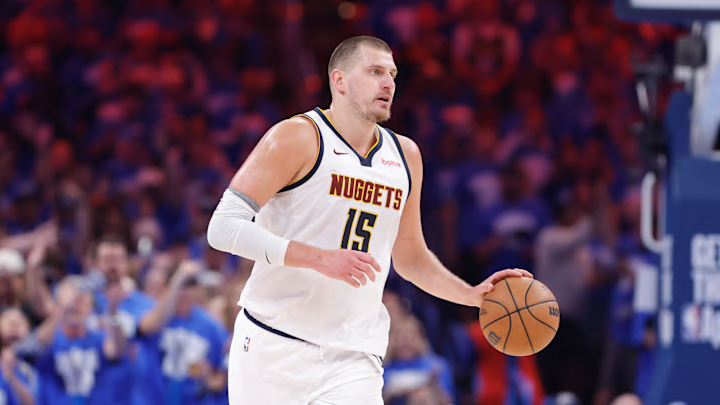The Western Conference might be more loaded than ever, with emerging contenders growing stronger while last year’s top seeds found creative ways to deepen their rosters. One such team is the Denver Nuggets, who have managed to check both boxes despite limited resources this offseason.
After two grueling seven-game series against the Los Angeles Clippers and Minnesota Timberwolves, the Nuggets made drastic changes — even after firing Michael Malone just weeks before the postseason. Michael Porter Jr. was traded to the Brooklyn Nets in exchange for Cameron Johnson, 2023 NBA champion Bruce Brown returned in free agency and Tim Hardaway Jr. brought his 3-point shooting from Detroit to Denver.
A team that hasn’t looked this strong since their championship run now faces a handful of questions fans are eager to have answered. So, here’s everything you need to know about the 2025-26 Denver Nuggets.
Denver Nuggets' traditional depth chart
Postion | Starting | ||
|---|---|---|---|
PG | Jamal Murray | Jalen Pickett | |
SG | Christian Braun | Julian Strawther | Tim Hardaway Jr. |
SF | Cameron Johnson | Bruce Brown | Hunter Tyson |
PF | Aaron Gordon | Peyton Watson | Zeke Nnaji |
C | Nikola Jokic | Jonas Valanciunas | DaRon Holmes II |
Denver Nuggets' modern depth chart
- Guards — Jamal Murray, Jalen Pickett
- Wings — Christian Braun, Julian Strawther, Bruce Brown, Tim Hardaway Jr.
- Forwards — Cameron Johnson, Aaron Gordon, Peyton Watson, Zeke Nnaji, Hunter Tyson
- Centers — Nikola Jokic, Jonas Valanciunas, DaRon Holmes II
Is Cameron Johnson a better option than Michael Porter Jr.?
Perhaps the biggest question surrounding the Nuggets is this: Did they actually improve by swapping Porter Jr. for Johnson?
Porter Jr.’s six seasons in Denver could only be described as a roller coaster — plagued by injuries early on but eventually carving out a regular role in the starting lineup. He averaged 16.2 points and 6.4 rebounds in 29.1 minutes per game as a Nugget, but many felt he had reached his ceiling with the team.
Enter Johnson. After two and a half seasons with the Brooklyn Nets, Johnson arrives in Denver more polished, having quietly refined the smaller aspects of his game during Brooklyn’s rebuild. In 57 starts last season, the 29-year-old averaged 18.8 points on 47% shooting from the field and 39% from beyond the arc.
While Porter Jr. may be the more natural scorer and rebounder, Johnson thrives as a catch-and-shoot option, and his health record gives him a major edge. If Johnson can stay on the floor, the Nuggets should have little to worry about offensively.
How good can Jonas Valančiūnas actually be?
When the Nuggets traded almost nothing to the Sacramento Kings for Jonas Valančiūnas, Denver finally answered the question fans had been asking for five years: Who will back up Nikola Jokić?
Valančiūnas doesn’t just provide relief so Jokić doesn’t have to log 40+ minutes a night — he also gives the Nuggets a legitimate, battle-tested center off the bench. Last season, he split time between the Washington Wizards and Kings, where his production dipped compared to earlier years. Much of that decline stemmed from moving into a reserve role and struggling to adjust.
Now the question is simple: Can Valančiūnas be reliable enough to matter? Defensive limitations and a lack of floor spacing made him expendable elsewhere, but Denver offers a clearer role with less pressure. If he can refine those weaknesses and earn trust from the coaching staff, he could become one of the Nuggets’ most valuable role players this season.
Does Nikola Jokić have a better or worse shot at reaching his fourth MVP?
It’s pretty remarkable to think that Jokić averaged a triple-double last season, scored 29.6 points per game and shot 57.6% from the field — yet still finished second in MVP voting. What could have been his fourth MVP in five years instead went to Shai Gilgeous-Alexander, the eventual NBA champion and Finals MVP.
Jokić’s ceiling is almost impossible to define, simply because he keeps raising it year after year. Whether it’s increasing his team’s win total or leading his position in rebounds, Jokić has never been fazed by the level of competition around him. This season, however, that ceiling may be tested more than ever.
Christian Braun continues to take strides as a scorer, Johnson now provides a legitimate perimeter threat and Denver’s new bench pieces offer both offensive and defensive versatility. The question is whether Jokić can remain the central figure amid all these changes. If he can push himself back into MVP territory, he could enter an even greater category: the conversation for the greatest center in NBA history.
